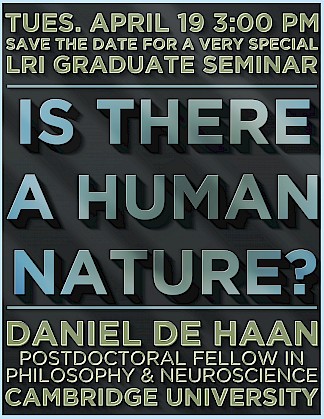

LRI GRADUATE SEMINAR – DANIEL DE HAAN, “IS THERE A HUMAN NATURE?”
***NOTE THE UNUSUAL TIME AND DAY***
Daniel De Haan is a postdoctoral fellow in the Faculty of Divinity, Cambridge University working on the neuroscience strand of the Templeton World Charity Foundation Fellowships in Theology, Philosophy of Religion, and the Sciences Project, directed by Sarah Coakley. He received his Ph.D. in Philosophy in 2014 from the Center for Thomistic Studies, University of St. Thomas, Houston, TX and the De Wulf-Mansion Centre for Ancient, Medieval and Renaissance Philosophy, Institute of Philosophy, Katholieke Universiteit Leuven, with a dissertation on “Necessary Existence and the Doctrine of Being in Avicenna’s Metaphysics of the Healing: On the Function of the Fundamental Scientific First Principles of Metaphysics.”
The Seminar will follow the usual format, with a light reception to follow; free and open to the public.
Is There a Human Nature?
The topic is on the function of concepts of life, life-form, human, person, natural kind, etc. in our ordinary recognition and attribution of vital properties to living beings. A case has been made for the exigency of these concepts for all biological thinking, including evolutionary theorizing. Certain Aristotelians (Foot, Thompson, Lott) use this to argue for the ineliminability of “human nature,” i.e., that evolution does not eliminate the reality of human nature. There are a number of Kantian naturalists and other naturalists here in Cambridge that are arguing to the contrary that Darwinian evolution establishes that there is no such reality as human nature, but such concepts must be a la Kant necessary heuristics.
Aristotelians like Macintyre, Foot, Thompson, Micah Lott, (even McDowell to some degree) defend not only the reality of life-forms that correspond to these necessary conceptual representations of life-forms for human beings, but also for all living things. They then contend that such concepts also reveal the reality of natural normativity, that natural goodness and defect are non-eliminable features of all living things, and that human “morality” is simply a very special case of species-specific natural goodness involving rational animals goods and defects.
One of the problems with this view (which I think all Thomists are in some way committed to) is the failure of Foot, Thompson, and Lott to provide a clear account of how we acquire such necessary “concepts/representations” and how they are informed by the empirical science that supposes them, and can be verified, modified, and corrected in light of such empirical work.
I want to draw on Lonergan to help free this view of natural normativity from its unnecessary “conceptualism” and to clarify how biological notions can function as discoverable, acquired, conceptualized, verified, and revisable, and even quasi-invariant, heuristics for all biological inquiry. I also want to draw on Lonergan’s views about finality and ethics to help amplify these views.
Major issues:
1. Cognitional theory and Epistemology of philosophical and scientific notions of “species” “life-forms”
2. Metaphysics of stability and evolution of biological “species”
3. Metaphysics of natural normativity (natural goodness and defect) in biological species
4. Metaphysics and meta-ethics of the specifically human form of natural normativity
